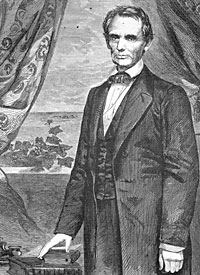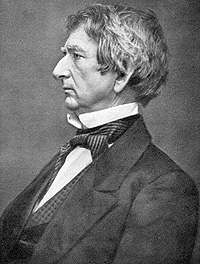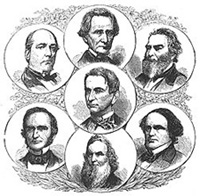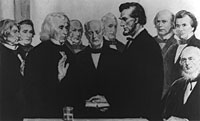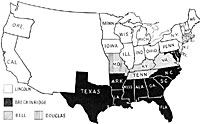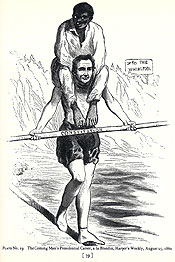In late October 1860, Mr Lincoln wrote a Tennessee lawyer: “I appreciate your motive when you suggest the propriety of my writing for the public something disclaiming all intention to interfere with slaves or slavery in the States; but in my judgment, it would do no good. I have already done this many – many, times; and it is in print, and open to all who will read. Those who will not read, or heed, what I have already publicly said, would not read, or heed, a repetition of it.” Candidate Lincoln closed with a biblical injunction: “‘If they hear not Moses and the prophets, neither will they be persuaded though one rose from the dead.'”1
There was considerable pressure in late 1860 for Mr. Lincoln to speak out on the impending secession and his intentions regarding slavery. Historian Richard H. Sewell wrote “Although he refrained from public statements during the interregnum between his election and his inauguration, Abraham Lincoln left little doubt of his utter hostility to any trimming on the territorial question. Characteristic was his advice (‘Private & confidential’) to Illinois Congressman Elihu B. Washburne. ‘Prevent, as far as possible, any of our friends from demoralizing themselves, and our cause, by entertaining propositions for compromise of any sort, on ‘slavery extension,’ he wrote in mid-December. ‘There is no possible compromise upon it, but which puts us under again, and leaves all our work to do over again. Whether it be a Mo. Line, or Eli Thayer’s Pop. Sov. It is all the same. Let either be done, & immediately filibustering and extending slavery recommences. On that point hold firm, as with a chain of steel.'”2
John G. Nicolay, who was President Lincoln’s aide and biographer, wrote: “Between the day when a President is elected by popular vote and that on which he is officially inaugurated there exists an interim of four long months, during which he has no more direct power in the affairs of government than any private citizen. However anxiously Mr. Lincoln might watch the development of public events at Washington and in the cotton States; whatever appeals might come to him through interviews or correspondence, no positive action of any kind was within his power, beyond an occasional word of advice or suggestion. The position of the Republican leaders in Congress was not much better. Until the actual secession of States, and the departure of their representatives, they were in a minority in the Senate; while the so-called South Americans and Anti-Lecompton Democrats held the balance of power in the House. The session was mainly consumed in excited, profitless discussion. Both the Senate and House appointed compromise committees, which met and labored, but could find no common ground of agreement.”3
In January 1861, President-elect Lincoln told the Reverend Albert Hale, who was minister at Springfield’s Second Presbyterian Church: “Compromise is not the remedy, not the cure. The South (that is, the leaders) don’t want it – won’t have it – no good can come of it. The system of compromise has no end. Slavery is the evil out of which all our other national evils and dangers have come. It has deceived and led us to the brink of ruin, and it must be stopped. It must be kept where it now is.”4 Mr. Lincoln claimed not to believe that the South would really secede. But he sought neither to conciliate or antagonize those contemplating secession. And he sought to say as little as possible that might antagonize either northerners or southerners. He wrote the Missouri Republican: “Please pardon me for suggesting that if the papers, like yours, which heretofore have persistently garbled and misrepresented what I have said, will now fully and fairly place it before their readers, there can be no further misunderstanding.”5
Like many Republicans, Mr. Lincoln also sought to downplay the danger the federal government faced. “After the election, the great question was whether they would recognize the danger in time. Up to this point there had been justification for their skepticism of secession,” wrote historian David M. Potter. “They had taken into account the element of bluff in the secession party, and the powerful Union sentiment which prevailed in the South. But they overlooked the fact that this Unionism was conditional, and that a threat may be intended as a bluff and still may be fulfilled if the bluff fails. In an effort to simplify the issue for the electorate, and to dissipate fears which they held to be groundless, they consistently denied that the secession threat deserved serious consideration. By these constantly repeated denials of danger they warped their own perspective, and destroyed their own capacity to evaluate the signs of the times. In the period following the election, new evidences of Southern unrest and new responsibilities of victory might well have led them to take a more realistic view. But the impact of events failed to arouse them to an awareness of the danger.”6
Mr. Lincoln wrote Alexander Stephens, a Georgian with whom he had served in Congress: “Do the people of the South really entertain fears that a Republican administration would, directly, or indirectly, interfere with their slaves, or with them, about their slaves? If they do, I wish to assure you, as once a friend, and still, I hope, not an enemy, that there is no cause for such fears. The South would be no more danger in this respect, than it was in the days of Washington. I suppose, however, this does not meet the case. You think slavery is right and ought to be extended; while we think it is wrong and ought to be restricted. That I suppose is the rub. It certainly is the only substantial difference between us.”7
To North Carolina Democrat John Gilmer, to whom a Cabinet position had been offered, Mr. Lincoln wrote regarding his views: “May I be pardoned if I ask whether even you have ever attempted to procure the reading of the Republican platform, or my speeches, by the Southern people? If not, what reason have I to expect that any additional production of mine would meet a better fate? It would make me appear as if I repented for the crime of having been elected, and was anxious to apologize and beg forgiveness. To so represent me, would be the principal use made of any letter I might now thrust upon the public. My old record cannot be so used; and that is precisely the reason that some new declaration is so much sought.
In response to Gilmer’s questions, Mr. Lincoln wrote: “On the territorial question, I am inflexible, as you see my position in the book. On that, there is a difference between you and us; and it is the only substantial difference. You think slavery is right and ought to be extended; we think it is wrong and ought to be restricted. For this, neither has any just occasion to be angry with the other. As to the state laws, mentioned in your sixth question, I really know very little of them. I never have read one. If any of them are in conflict with the fugitive slave clause, or any other part of the constitution. I certainly should be glad of their repeal; but I could hardly be justified, as a citizen of Illinois, or as President of the United States, to recommend the repeal of a statute of Vermont, or South Carolina.”8
Mr. Lincoln chose not to fuel secession, but neither would he do anything to dampen the coals which secessionists fanned. Historian Allen C. Guelzo wrote: “Lincoln’s obtuseness to the secession threat was probably the greatest political misjudgment of his life. But it was rooted in this conviction that the agitation for slave extension in the 1850s, and now the secession fever, were the work of the same planter oligarchy that had fashioned Kansas-Nebraska, and the same Democratic elites who had for so long misled and manipulated the ordinary nonslaveholding whites to the South.”9
In January 1861, Mr. Lincoln was asked about a compromise based on extending the line of the Missouri Compromise. Mr. Lincoln said that “although the recent presidential election was a verdict of the people in favor of freedom upon all the territories, yet, personally, he would be willing for the sake of the Union to divide the territory we now own by that line, if in the judgment of the nation it would save the Union and restore harmony. But whether the acquisition of territory hereafter would not reopen the question and renew the strife, was a question to be thought of and in some way provided against.”10During the transition, Mr. Lincoln said of compromise that “it was sometimes better for a man to pay a debt he did not owe, or to lose a demand which was a just one, than to go to law about it, but then, in compromising our difficulties, he would regret to see the victors put in the attitude of the vanquished, and the vanquished in the place of the victors. He would not contribute to any such compromise as that.”11
While his future Secretary of State William H. Seward was seeking such a compromise with the South, Mr. Lincoln was seeking to derail any compromise of which he disapproved. Historian George H. Mayer wrote that “The President-elect made it clear that he had no objections to legislation that would reassure Southerners regarding the safety of slave property in the states. On the other hand, he flatly opposed any modification of the Republican pledge to exclude slavery from the territories.”12 Historian Burton J. Hendrick wrote: “This Weed-Seward definite suggestion of extending the Missouri line, Lincoln insisted, was another attempt to build up a ‘new slave empire.’ Such was the scarcely concealed purpose of the so-called Crittenden Compromise then enjoying the distracted attention of Congress – a compromise which, as its main item, embraced the suggestion Weed had put forth. This drew an imaginary line of latitude 35° 30′, extending from the southern boundary of Missouri to California, north of which slavery was to be forever excluded, but south of which – territory now including Oklahoma, New Mexico, Arizona – it was to be permitted. The phraseology of the proposed constitutional amendment – for this principle, as well as other concessions favorable to the slave interest, was to be imbedded in the fundamental law – comprised more than this. Slavery was to become legal not only in all territories ‘now held’ by the United States south of this line, but in all ‘hereafter acquired’ south of the same parallel. It was that ‘hereafter acquired’ that made Lincoln, and most other orthodox Republicans, look upon the Crittenden Compromise as a plan to create a ‘new slave empire.'”13
Massachusetts Senator Charles Sumner, for example, was firmly against compromises. He wrote Senator Seward: “On the territorial question – that is, the question of extending slavery under the national auspices – I am inflexible. I am for no compromise which assists or permits the extension of the institution on soil owned by the nation. And any trick by which the nation is to acquire territory, and then allow some local authority to spread slavery over it, is as obnoxious as any other. I take it that to effect some such result as this, and to put us again on the high road to a slave empire, is the object of all these proposed compromises. I am against it.”14
Summer was not alone. “Provoking though the conduct of the six secessionists was, the fact remains that the chief responsibility for the defeat of the compromise falls upon the twentyfive Republicans who voted to slay it. A combination of Republicans and Northern Democrats could easily have carried the resolutions,” wrote historian Allan Nevins. “That responsibility the Republicans should squarely have accepted, and unquestionably Lincoln and his principal associates did so accept it. Once more, we must bear in mind that the central tenet of the Republican Party, ever since its foundation, had been the exclusion of slavery from all new territories. We must also bear in mind that to Lincoln this doctrine of the containment of slavery represented much more than an objective, a goal. It represented a beginning a new start. It represented, that is, the point at which one phase in the consideration of the great problems of slavery and race adjustment ended, and another phase began.”15
According to historian Mayer, “The people clamoring for the Crittenden Compromise overlooked the fact that secessionist leaders in the Gulf states did not regard it as an acceptable settlement. Moreover, most Southern congressmen concealed their opposition because they hoped the Republicans would kill the Crittenden Compromise and thereby drive the wavering Border states to secede.”16 Northern Congressmen did just that, according to Lincoln biographers John G. Nicolay and John Hay wrote:
The North could not yet believe that the designs of the Cotton-State hotspurs were so desperate. The more conservative Congressmen from the North and from the border States still hoped that good might come if an effort of conciliation and compromise were once more renewed. Accordingly, near the close of the session (February 27, 1861), Mr. [Thomas] Corwin, Chairman of the House Committee of Thirty-three, brought forward one of the propositions which had been reported more than a month before his Committee. The original report proposed, in substance, an amendment of the Constitution providing that any constitutional interference with slavery must originate with the slave States, and have the unanimous assent of all the States to become valid. Mr. Corwin, by an amendment, changed the phraseology and purport to the following:
ART. 13. No amendment shall be made to the Constitution which will authorize to give to Congress the power to abolish or interfere within any State with the domestic institutions thereof, including that of persons held to labor or service by the laws of said State.
This amendment was adopted by the House on February 28, yeas 133, nays 65; the Senate also passed it during the night preceding the 4th of March, though in the journals of Congress it appears dated as of March 2. The variation is explained by the fact that the legislative day of the journal frequently runs through two or more calendar days. In that body the vote was, yeas 24, nays 12, and it was approved by President Buchanan, probably only an hour or two before the inauguration of his successor.
Mr. Lincoln alluded to this amendment in his inaugural address, reciting its substance and giving it his unreserved approval. ‘I understand,’ he said, ‘a proposed amendment to the Constitution – which amendment, however, I have not seen – has passed Congress, to the effect that the Federal Government shall never interfere with the domestic institutions of the States, including that of persons held to service. To avoid misconstruction of what I have said, I depart from my purpose not to speak of particular amendments so far as to say that, holding such a provision to now be implied constitutional law, I have no objection to its being made express and irrevocable. The new Administration soon after transmitted this joint resolution to the several States to receive their official action. But nothing came of it. The South gave no response to the overture for peace, and in the North it was lost sight of amid the overshadowing events that immediately preceded the outbreak of hostilities.
While no practical benefit grew out of the constitutional amendment, other measures were adopted by Congress, which proved of value later in the struggle. The retirement of the Southern Members gave the Republicans a certain power of legislation in both branches, though under conditions which required them to be circumspect and conservative. Indeed, their policy during, this stormy and difficult period was to remain strictly on the defensive. They must wait patiently until Mr. Buchanan’s term should expire, and until Mr. Lincoln could be inaugurated and assumed control of the executive functions. We find, therefore, in the Congressional debates only so much party assertion as declared that they would not recede from the position taken by the party and indorsed by the people in the Presidential election. Indeed it may be said that they did not fully maintain their position. They consented to the passage of the bills organizing the new Territories of Colorado, Dakota, and Nevada, without insisting that they should contain a prohibition of slavery. While this might be regarded as an important concession, and was claimed by Douglas as an abandonment of the Chicago platform, yet by this moderation they perhaps also secured the admission of Kansas into the Union as a free State, which greatly strengthened their power in the Senate.17
Back in Springfield, Mr. Lincoln saw the limits to effective compromise. Maurice G. Baxter, biographer of longtime Lincoln friend Orville H. Browning, wrote: “On February 9, 1861, Browning met Lincoln at the Chenery House in Springfield. The main topic of conversation was the border-state peace convention. Both men agreed that more harm than good would come out of this effort. It was sure to fail in its attempt to pacify sectional feeling, and with its inevitable collapse the feeling of failure and discouragement would have a worse effect than no action at all. John J. Crittenden’s proposed constitutional amendments, then being presented as a compromise, offered little hope at this juncture. Neither Browning nor Lincoln was willing to concede to the South the extension of slavery into the territories. And, above all else, the Union should not be divided into two confederacies, for more bloodshed would result from this than from any move to preserve the old relationship between the states. A slave nation and a free nation could not live side by side in peace. Browning thought that Lincoln’s ideas corresponded with his own. he may have expected the President to be indecisive, but he found him unexpectedly firm.”18
Historian Allan Nevins wrote: “The psychological and political effects of such an acceptance, however, would in Lincoln’s eyes have been disastrous in the extreme. At one blow, all hope of lifting the slavery discussion, so long a futile debate between the positive-evil and positive-good schools and so totally out of key with the aspirations of civilization, to a new, enlightened, and constructive plane, would be ended.”19 Nevins wrote: “To Lincoln, therefore, and all who shared his views, it seemed wise to stand on principle, hoping that it could be peaceably maintained. For great causes, great risks have to be taken.”20
These were really two parallel efforts to seek compromise with the South. Lincoln biographer Robert Morse wrote: “Collaterally with these congressional debates there were also proceeding in Washington the sessions of the Peace Congress, another futile effort to concoct a cure for an incurable condition. It met on February 4, 1861, but only twenty-one States out of thirty-four were represented. The seven States which had seceded said that they could not come, being ‘Foreign Nations.’ Six other States held aloof. Those Northern States which sent delegates selected ‘their most conservative and compromising men,’ and so great a tendency towards concession was shown that Unionists soon condemned the scheme as merely a deceitful cover devised by the Southerners behind which they could the more securely carry on their processes of session.”21
Vermont Republican Lucius Chittenden recalled Mr. Lincoln meeting with Peace Convention delegates: “Mr. Lincoln’s reception of the delegates as was of an entirely informal character. There was no crowded approach, no hurried disappearance; no procession of the members where he stood. There was a point of attraction – not of repulsion.”22 Chittenden reported:
There was only one occurrence which threatened to disturb the harmony and good humor of the reception. In reply to a complimentary remark by Mr. Lincoln, Mr. [William] Rives had said that, although he had retired from public life, he could not decline the request of the Governor of Virginia that he should unite in this effort to save the Union. “But,” he continued, “the clouds that hang of it are very dark. I have no longer the courage of my younger days. I can do little – you can do much. Everything now depends upon you.”
“I cannot agree to that,” replied Mr. Lincoln. “My course is as plain as a turnpike road. It is marked out by the Constitution. I am in no doubt which way to go. Suppose now we all stop discussing and try the experiment of obedience to the Constitution and the laws. Don’t you think it would work?”
“Permit me to answer that suggestion,” interposed Mr. [George William] Summers. ‘Yes, it will work. If the Constitution is your light, I will follow it with you, and the people of the South will go with us.”
“It is not of your professions we complain,” sharply snuck Mr. [James A.] Seddon’s sepulchral voice. “It is of your sins of omission – of your failure to enforce the laws – to suppress your John Browns and your Garrisons, who preach insurrection and make war upon our property?”
“I believe John Brown was hung and Mr. Garrison disappointed,” dryly remarked Mr. Lincoln. “You cannot justly charge the North with disobedience to statutes or with failing to enforce them. You have made some which were very offensive, but they have been enforced, nothwithstanding.”
“You do not enforce the laws,” persisted Mr. Seddon. ‘You refuse to execute the statue for the return of fugitive slaves. Your leading men openly declare that they will not assist the marshals to capture or return them.”
“You are wrong in your facts again,” said Mr. Lincoln. “Your slaves have been returned, yes, from the shadow of Faneuil Hall in the heart of Boston. Our people do not like the work, I know. They will do what the law commands, but they will not volunteer to act as tip-staves of bum-bailiffs. The instinct is natural to the race. Is it not true of the South? Would you join in the pursuit of a fugitive slave if you could avoid it? Is such the work of gentlemen?”
“Your press is incendiary!’ said Mr. Seddon, changing his base. “It advocates servile insurrection, and advises our slaves to cut their masters’ throats. You do not suppress your newspapers. You encourage their violence.”
“I beg your pardon, Mr. Seddon,” replied Mr. Lincoln. “I intend no offence, but I will not suffer such a statement to pass unchallenged, because it is not true. No Northern newspaper, not the most ultra, has advocated a slave insurrection or advised the slaves to cut their masters’ throats. A gentleman of your intelligence should not make such assertions. We do maintain the freedom of the press – we deem it necessary to a free government. Are we peculiar in that respect? Is not the same doctrine held in the South?”23
Clearly, Mr. Lincoln would not be bullied. Historian Morse wrote of the Convention delegates: “These gentlemen talked a great deal and finally presented a report or plan to Congress five days before the end of the session; the House refused to receive it, the Senate rejected it by 7 ayes to 28 nays. The only usefulness of the gathering was as evidence of the unwillingness of the South to compromise.”24 According to Frank Van der Linden in Lincoln Road to War, “the Senate debate raged on until, on the dawn of Lincoln’s inaugural day, the Corwin amendment affirming the legality of slavery in the Southern states passed by the bare minimum two-thirds margin, 24 to 12. Then the Peace Convention’s proposals were defeated, 28 to 7, and the Crittenden measure was finally placed in its grave, 20 to 19.”25
Meanwhile, a battle raged within the Republican Party over the selection of a cabinet and its importance for policy within the Lincoln Administration. Historian Allan Nevins wrote: “Antagonism between the moderate and the ‘iron-back’ wings of the party, long jealous and suspicious, grew more bitter as each reached for power. [Massachusetts Senator Charles] Summer was now ranting about Sewardism as a fatal policy of cowardice. To Congressional friends he orated, declaimed, and issued ukases after his wont, saying that the path of duty was plain as Washington Monument. [Charles Francis] Adams set him down as ‘crazy – actually frantic.’ He said he would give up nothing, not even the Personal Liberty law of Massachusetts. Characteristically, he denounced Seward to his face. Just before the New Yorker made his great Senate speech on conciliation, Sumner went to his house, heard it read, and angrily protested. ‘I pleaded with him,’ he told friends, ‘for the sake of the cause, the country, and his own good name, to abandon all his propositions and simply declare that Mr. Lincoln would be inaugurated on the 4th March President of the United States, and to rally the country to his support.'”26
Mr. Lincoln did compromise by including in his Cabinet a range of Republican opinion from moderate Seward to radical Chase. “Three days after the inauguration, Representative T.A.R. Nelson of Tennessee, a strong unionist of the American Party, obtained an interview at the White House,” wrote historian Allan Nevins. “Lincoln said that he was anxious to maintain peace, and believed that the Federal revenues should not be collected in the seceded States until men had time for reflection. As he still regarded Southerners as members of the national family, he was not inclined to deny them mail facilities. Congress was equally hopeful and still more anxious for peace. Up to the end of its session on March 3, it had been careful not to give the South needless offense. No Republican Senator made any effort to press the bill outlawing slavery in the old Territories which the House had passed in the first session of the 36th Congress. It was not necessary (New Mexico after ten years of slavery protection had only twenty-two slaves, ten of them transients), and not politic.”27
At time, Mr. Lincoln during this period may have seemed irresolute, but he was guided to his duty to the Constitution. “Timid men said before Mr. Lincoln’s inauguration that we had seen the last president of the United States. A voice in influential quarters said, ‘Let the Union slide.’ Someone said that a Union maintained by the sword was worthless,” wrote black abolitionist Frederick Douglass in a speech 11 years after Mr. Lincoln’s death. “Others said a rebellion of eight million cannot be suppressed. But in the midst of all this tumult and timidity, and against all this, Abraham Lincoln was clear in his duty, and had an oath in heaven. He calmly and bravely heard the voice of doubt and fear all around him; but he had an oath in heaven, and there was not power enough on earth to make this honest boatman, backwoodsman, and broad-handed splitter of rails evade or violate that sacred oath. He had not been schooled in the ethics of slavery; his plain life had favored his love of truth. He had not been taught that treason and perjury were proof of honor and honesty. His moral training was against his saying one thing when he meant another. The trust which Abraham Lincoln had in himself and in the people was surprising and grand, but it was also enlightened and well-founded. He knew the American people better than they knew themselves, and his truth was based upon this knowledge.”28
Dr. Alexander Milton Ross attended a White House Dinner in 1861 at which he was asked to provide intelligence on Confederate activities in Canada. When Ross said he could assume those responsibilities with more enthusiasm if emancipation were a goal of the war, President Lincoln replied: “I sincerely wish that all men were free, and I especially wish for the complete abolition of slavery in this country; but my private wishes and feelings must yield to the necessities of my position. My first duty is to maintain the integrity of the Union. With that object in view, I shall endeavor to save it, either with or without slavery….”29
Footnotes
- Roy P. Basler, editor, The Collected Works of Abraham Lincoln, Volume IV, p. 130 (Letter to William S. Speer, October 23, 1860).
- Richard H. Sewell, Ballots for Freedom: Antislavery Politics in the United States, 1837-1860, p. 364 (Roy P. Basler, editor, The Collected Works of Abraham Lincoln, Volume IV, p.161).
- John G. Nicolay, A Short Life of Abraham Lincoln, p. 167.
- Don E. and Virginia E. Fehrenbacher, editor, Recollected Words of Abraham Lincoln, p. 193 (Letter from Albert Hale to Theron Baldwin, January 16, 1861).
- Benjamin Thomas, Abraham Lincoln, p. 226.
- Donald M. Potter, Lincoln and His Party in the Secession Crisis, .
- Roy P. Basler, editor, The Collected Works of Abraham Lincoln, Volume IV, p. 160 (Letter to Alexander Stephens, December 22, 1860).
- Roy P. Basler, editor, The Collected Works of Abraham Lincoln, Volume IV, p. 151-152 (Letter to John Gilmer, December 15, 1860).
- Allen C. Guelzo, Abraham Lincoln: Redeemer President, p. 254.
- Don E. and Virginia E. Fehrenbacher, editor, Recollected Words of Abraham Lincoln, p. 6-7 (printed in New York Times, January 14, 1861).
- Don E. and Virginia E. Fehrenbacher, editor, Recollected Words of Abraham Lincoln, p. 7 (printed in New York Times, January 14, 1861).
- George H. Mayer, The Republican Party, 1854-1964, p. 79.
- Burton J. Hendrick, Lincoln’s War Cabinet, p. 135.
- Moorfield Storey, Charles Sumner, p. 193-194.
- Allan Nevins, The Emergence of Lincoln: Prologue to Civil War, 1859-1861, p. 403.
- George H. Mayer, The Republican Party, 1854-1964, p. 79.
- John G. Nicolay and John Hay, Abraham Lincoln: A History, Volume III, p. 235-237.
- Maurice G. Baxter, Orville H. Browning: Lincoln’s Friend and Critic, p. 115-116.
- Allan Nevins, The Emergence of Lincoln: Prologue to Civil War, 1859-1861, p. 404.
- Allan Nevins, The Emergence of Lincoln: Prologue to Civil War, 1859-1861, p. 404.
- Frank Van der Linden, Lincoln Road to War, p. 217.
- Lucius E. Chittenden, Recollections of President Lincoln and His Administration, p. 71-72.
- Lucius E. Chittenden, Recollections of President Lincoln and His Administration, p. 72-74.
- Robert Morse, Abraham Lincoln, Volume I, p. 203.
- Frank Van der Linden, Lincoln Road to War, p. 217.
- Allan Nevins, The Emergence of Lincoln: Prologue to Civil War, 1859-1861, p. 438-439.
- Allan Nevins, The War for the Union: The Improvised War, 1861-1862, p. 14 (Representative Nelson described his interview in the Knoxville Whig, March 19, 1861).
- Frederick Douglass, Life and Times of Frederick Douglass, p. 488-489 (Speech at the Freedmen’s Monument, April 16, 1876).
- Don E. and Virginia E. Fehrenbacher, editor, Recollected Words of Abraham Lincoln, p. 386.
Visit
Orville H. Browning (Mr. Lincoln and Friends)
Orville H. Browning (Mr. Lincoln’s White House)
William Cullen Bryant (Mr. Lincoln and New York)
James Gordon Bennett (Mr. Lincoln and New York)
Salmon P. Chase (Mr. Lincoln’s White House)
Frederick Douglass (Mr. Lincoln’s White House)
Horace Greeley (Mr. Lincoln and Friends)
Horace Greeley (Mr. Lincoln and New York)
Horace Greeley (Mr. Lincoln’s White House)
William H. Seward (Mr. Lincoln and Friends)
William H. Seward (Mr. Lincoln and New York)
William H. Seward (Mr. Lincoln’s White House)
Charles Sumner (Mr. Lincoln and Friends)
Charles Sumner (Mr. Lincoln’s White House)
Thurlow Weed (Mr. Lincoln and Friends)
Thurlow Weed (Mr. Lincoln and New York)
Thurlow Weed (Mr. Lincoln’s White House)




